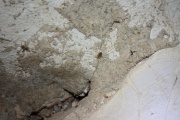Invertebrates (Inventory)/Harvestman
From LagWiki
(Difference between revisions)
| Line 2: | Line 2: | ||
The '''Harvestman''' field of the [[Invertebrates (Inventory)|Invertebrates]] section is used to record any observation of harvestmen. | The '''Harvestman''' field of the [[Invertebrates (Inventory)|Invertebrates]] section is used to record any observation of harvestmen. | ||
| - | Although superficially similar to [[Invertebrates (Inventory)/ | + | Although superficially similar to [[Invertebrates (Inventory)/Spiders|spiders]], harvestmen are a distinct order that is not closely related to spiders. Harvestmen are arachnids and can be easily distinguished from even long-legged spiders by a single body region and a single pair of eyes. Spiders have a separate abdomen and multiple pairs of eyes. |
Harvestmen are colloquially known as "daddy longlegs" or "granddaddy longlegs", because of their extremely long legs. They can be found in caves, usually near the twilight areas in moist, dark locations, often under ledges or on the ceiling. They may react to light as they are often not blind. | Harvestmen are colloquially known as "daddy longlegs" or "granddaddy longlegs", because of their extremely long legs. They can be found in caves, usually near the twilight areas in moist, dark locations, often under ledges or on the ceiling. They may react to light as they are often not blind. | ||
Revision as of 03:48, 17 April 2014

Harvestman (note the cricket, left)
The Harvestman field of the Invertebrates section is used to record any observation of harvestmen.
Although superficially similar to spiders, harvestmen are a distinct order that is not closely related to spiders. Harvestmen are arachnids and can be easily distinguished from even long-legged spiders by a single body region and a single pair of eyes. Spiders have a separate abdomen and multiple pairs of eyes.
Harvestmen are colloquially known as "daddy longlegs" or "granddaddy longlegs", because of their extremely long legs. They can be found in caves, usually near the twilight areas in moist, dark locations, often under ledges or on the ceiling. They may react to light as they are often not blind.
See also
